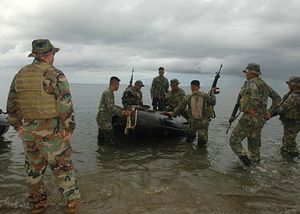Admiral Jonathan Greenert, the U.S. Chief of Naval Operations, is in the Philippines this week in a visit designed to bolster defense ties between the two allies. While there, Greenert told students of the National Defense College of the Philippines that the U.S. would fulfill its treaty obligations by coming to the Philippines’ aid in the event of a Chinese occupation of disputed territories. “Of course, we would help you,” Greenert said.
Last week, U.S. Secretary of State John Kerry similarly reiterated America’s defense commitment to Japan after a meeting with Japanese Foreign Minister Fumio Kishida. Kerry said that “the United States remains as committed as ever to upholding our treaty obligations with our Japanese allies. That includes with respect to the East China Sea.” According to a senior State Department official, Kerry also plans to reaffirm the United States’ alliance commitments to South Korea during his time in Seoul today.
Kerry’s promises to Japan and South Korea did not go unnoticed in the Philippines. A statement from the Presidential Communications Operations Office said that the Philippines hoped to receive the same assurances from the United States. “We continue to believe that when the need comes, the U.S. will stand by its commitments to our country based on existing agreements between the U.S. and the Philippines,” the statement said.
From this perspective, the Philippines may actually have been disappointed with the assurances they were given. Greenert only addressed the issue in response to a direct question, according to Reuters, whereas John Kerry assured Japan of America’s commitment as part of his formal remarks. Greenert also carefully hedged his response by remaining vague as to the type of assistance the U.S. would provide. “We have an obligation [to help the Philippines] because we have a treaty. But, I don’t know in what capacity that help is,” Greenert said.
In the event of a military conflict with China, the Philippines would need the U.S. military to intervene to have any chance of victory. Should the U.S. instead restrict itself to providing arms or advice (which would fulfill the vague assurance of “help” that Greenert gave), China would still prevail in a hypothetical clash over the disputed territories. From Greenert’s comments (and the fact that they came only in response to a question), it sounds like the U.S. is not prepared to give a full assurance of military support to the Philippines.
The U.S. military had to know that Greenert, as the Chief of Naval Operations, would receive questions about the nature of U.S. security commitments to the Philippines. After all, he was visiting the Philippines on a mission “to strengthen the ties and interoperability between the two navies and further realize peace and stability in the region,” according to a Navy spokesman. A statement about the strength of the U.S. commitment to the Philippines would be a natural part of that mission, especially considering recent tensions between Manila and Beijing. If Greenert did not make a stronger commitment about the nature of U.S. assistance, then the Pentagon is not willing to make such a commitment.
When U.S. President Barack Obama visits the Philippines (as well as Japan, South Korea, and Malaysia) in April, Manila will likely look for a stronger confirmation of the United States’ security obligations. Whether or not such assurances are forthcoming will be an interesting strategic choice for the Obama administration. On one hand, U.S. strategists feel that only a strong U.S. commitment to its regional allies can deter what is seen as Chinese aggression in the region. On the other hand, Chinese officials (and some U.S. thinkers as well) believe that promises of unconditional support from the United States only encourages provocative moves on the part of U.S. allies such as Japan and the Philippines — and the U.S. does not want to find itself dragged into a conflict with China because an ally escalated tensions. The Philippines, as one of the militarily weakest U.S. allies in the region (and thus the most dependent on U.S. security assurances), will be an interesting test case for the Obama administration.

































